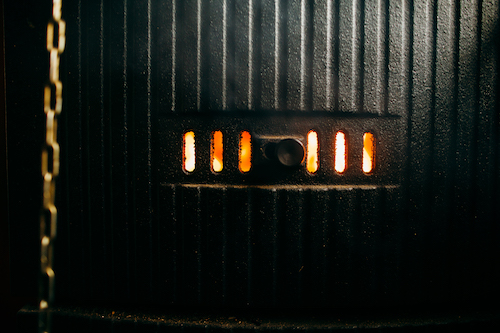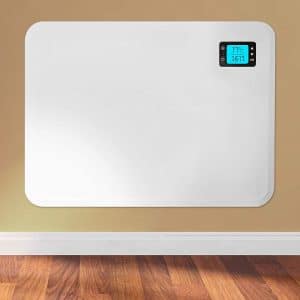With colder temperatures taking over, space heaters are a welcome addition to the home as they will provide a supplementary source of heat. However, users need to be wary of this innovative machine.

For instance, statistics from the National Fire Protection Association (commonly known as the NFPA) as well as the UK Fire Association (UKFA) shows that heating equipment is the second highest cause of house fires in the United States. It is also the third-highest cause of house fire fatalities. Almost half of the house fires caused by heating equipment were as a result of stationary and portable space heaters.
Unsurprisingly, the majority of space heater fires happen between December to February. Even though just eighteen per cent of heater fires happen between midnight and 8 am, these hours actually account for almost half of the deaths, according to the NFPA.
However, the truth is that in most of these cases, the issue isn’t that these heaters are not safe to use, it’s because they were used in an unsafe manner. The highest cause of heater fires is when the equipment is placed very close to flammable things like clothing, curtains, paper, bedding, mattresses, upholstered furniture or even flammable liquids like alcohol, etc. A major fire outbreak can occur if the ignition is sparked by a space heater left unattended.

Through misuse, space heaters could actually lead to electrical hazards. When you plug your heater to an extension cord or power board, you might overwhelm the circuit and start a fire. A lot of power boards and extension cords are not built to withstand the kind of electrical current that a small heater generates. The high level of current required to power a heater can lead to the wires in these power points and cords to overheat and lead to a fire.
Due to this particular reason, you shouldn’t leave a heater running in your home or office without adequate supervision. No matter the quality or nature of your space heater, it is always advisable to monitor it – like all other electrical appliances.
Can I use an extension cord with my electric blanket?
This is quite a very common question among users. Users have two choices here, with the safest option being to plug the electric blanket to the wall. The alternative is to verify if the extension cord you own will be able to handle the current that your electric blanket will generate.
Just ensure that the amps on the cord are higher than the electric blanket’s. If you cannot check the amps on your cord, it is advisable that you plug your blanket to the wall.
Portable heaters are generally used in supplementing the main heating system. They could also be used to heat a room so as to avoid paying so much for a central heating system for the entire house. In a handful of homes, a heater is utilized to increase the temperature of some rooms, especially those rooms used by people who are sensitive to cold (e.g. infants and elderly people).
Types of space heaters
There are four main kinds of space heaters:
-
Fan-forced heaters
This type is popular in workspaces and offices. These types of heater often warm air using metal coils and this air is then circulated across the room with the help of a fan. This fan makes sure that the heat distribution is fast and effective.
-
Ceramic heaters
This is also a convection heater. This particular kind warms air using a ceramic heating material. The bodies of these heaters usually remain cool to touch, which makes them a very popular option amongst users with pets and kids.

-
Radiant heaters
With this heater, the way it works is that water or heated oil flows through the heater. This, in turn, will heat objects and persons close to it. Most of the time, they are used in bedrooms, dens or living rooms due to the fact that they can retain heat for a long time – even when the power has been turned off.
-
Infrared heaters
This is a kind of radiant heater, with heat created by the use of infrared bulbs. Their best use is for warming a small area or just one person, as opposed to a large area or more than one person. For example, a user might decide to place it under their desk during the winter.
Majority of space heaters work using conviction, meaning circulating warm air throughout rooms. Some heaters use radiant heating that requires emission of infrared radiation that will directly heat people and objects close to the heater. These heaters are more effective because they heat objects and people directly instead of the whole room.
However, because they heat objects nearby, they can actually lead to a fire outbreak if a flammable material comes close to the heater. The NFPA states that majority of house heating fires are caused by the heater being positioned very close to things that can burn, e.g. bedding, clothing, upholstered furniture, mattresses, etc.
Just like all electrical devices, heaters pose a shock hazard as well. Whether it’s convection or radiant heaters, electric space heaters can result in shock if components like the plug, housing or cord are damaged and subsequently lead to exposure to electric current. This could then cause a fire or lead to an electrical burn. Machines like this consume a lot of energy and they can quickly overload circuits, thereby leading to fire or power failure.
Heaters that make use of propane, kerosene or natural gas can be quite dangerous if there’s a leak and it ignites. Kerosene and propane can also cause asphyxiation in the event that carbon monoxide emissions are not vented properly.

Choosing the most suitable portable heater for your home
Heaters are usually used in the event that the main heating system of a home is ineffective or when central heating is just too costly to operate. Users appreciate this unit’s potential to save energy and money due to the fact they only heat a particular space.
The following features should be considered when selecting a portable heater for your home, office or workspace:
- The tip-over function that will automatically shut down the heater in the event that it accidentally falls over.
- The overheat protection that will also automatically shut down the heater once it starts to get too hot or once it starts to approach unsafe heat levels.
- A thermostat that will monitor the room temperature and subsequently turn on and off the unit as the temperature leads.
- A great handle with a comfortable and ergonomic grip.
- For combustion models, they should come with a low-oxygen sensor which will shut off the heater when the oxygen reduces (so the room doesn’t lose too much oxygen).
Tips for safely using heaters to prevent home fires
With correct and safe use, these portable heaters can actually be safe and effective tools for generation of heat in your home. In that light, here are some tips that will definitely help you use your heater safely:
- Before making use of the space heater, ensure that you read the instructions as well as the warning labels.
- Conduct an inspection on the heater, plug, cord, for damage before you use them each time. Be watchful of broken or cracked plugs or any loose connection. Do not make use of the heater if you see signs of damage, wear or fraying.
- Placement of the space heater is absolutely important. Try to commit these rules to your memory: Heaters should be placed at least three feet from any flammable material like furniture, rugs or bedding. Also, you should create a three-feet kid and pet-free zone away from the heaters. Ensure that you carefully supervise both your children and pets when the heater is on.
- Place the heater on a flat and solid surface. Ensure you don’t put them on furniture, carpets, tables or cabinets. They can overheat or fall off and subsequently start a fire.
- Never leave your heater unattended for long periods. If you plan on leaving the house, turn it off. To be on the safe side, you should also turn it off before going to bed.
- Always try to unplug the heater when you’ve turned it off. After doing this, safely store it away.
- Heaters are solely meant to supplement the main heat source. They should not be used to cook food, dry clothes, thaw pipes or warm bedding.
- Heaters use a significant amount of power. Make sure you plug them directly into an outlet that isn’t being used by any other device.
- Don’t place an electrical cord under a carpet or rug. This could cause damage to the cord, which in turn could lead to the cord (or objects around it) burning. Also, don’t make use of power strips or extension cords. They could overheat and start a fire.
- When in use, frequently check the heater to determine if its cord, plug, wall outlet or faceplate are hot. If any faceplate or outlet is hot, stop using the heater immediately. Then, call a qualified electrician to replace it. If you notice that the plug or cord is hot, quickly disconnect the heater and get it repaired by a legitimate repair person.
- Your space heater should not be a tripping hazard in your home. Ensure that you position them in places that have reduced foot traffic. Also, don’t put them close to doorways where they might accidentally get knocked down.
- Always place your electric heaters in places that are dry. This is because moisture could lead to electrocution and damage to the components of the heater. Don’t ever touch a heater if your hands are not dry.
- For fuel space heaters, always make use of the kind of fuel that was specified by the heater’s manufacturer. Also, don’t use this kind of heater indoors. Before refueling the heater, wait until it is cool. If you want to store extra fuel, do so far away from the heater.
- Wondering whether the old space heater you stored in your garage is still safe for use? Set out time to look at it. Is the cord stiff or frayed? If yes, then it’s time to get a new heater. Also, check if the heater has any dents or cracks, the grill is still firmly in place and the plug has no loose connections.
- Ensure that you only purchase heaters that have been designed with most of the modern safety features.
Heat and smoke sensors will be able to detect heater fires before they can cause significant harm
Accidents can happen – even when we’ve observed the strictest of precautions. It’s just the way of the world sometimes. Installing heat and smoke sensors that are connected to a smart security system will go a long way in keeping you, your loved ones and your home safe from heater fires during this period.
These heat and smoke sensors will be able to detect little amounts of smoke, a rise in heat, high temperatures, etc – and subsequently sound an alarm before it gets out of control.
These days, modern homes are packed with synthetic materials that lead to fires burning out more rapidly than before. This leaves inhabitants with lesser time to leave the house or stop the fire outbreak. If your heater burns your furniture, finding out about the fire and putting it off at the earliest opportunity is absolutely necessary to protecting you, your loved ones and your property.
Regular smoke detectors will just continue beeping if there’s no one at home. However, with this one, the sensors are connected to a smart system that ensures help is provided during an emergency.
Heat and smoke sensors will instantly notify monitoring professionals about a problem it has come across. The sensors will also alert the homeowner, who will be able to check the video in real-time to ascertain the seriousness of the outbreak (that’s if they have security cameras in their home).
The monitoring service will also contact the homeowner when they receive an alert. They will then send for the fire department once they (the homeowner) can confirm the fire or if they cannot be reached.
